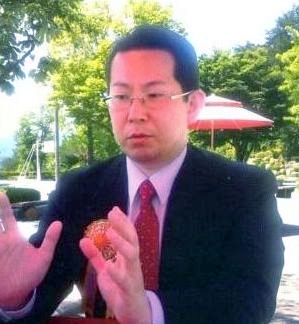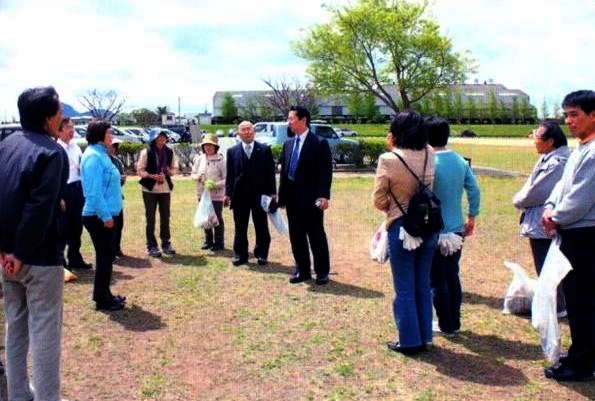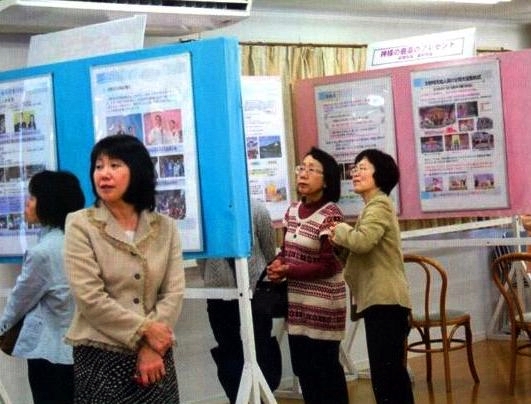![]()
The Words of the Hori Family
|
|
The Words of the Hori Family |

Rev. Hori is among what Japanese members call "the first batch," that is, the first group of Blessed Children born in Japan, to members of the forty-three-couple blessing group (1969). Specifically, he is the first child born among the first batch.
Question: I understand you are the first Japanese Blessed Child.
Yes. True Father gave me the name Masaichi. Ichi means "one."
Question: Was that a source of added pressure? You carry ichi with you every day.
Of course, there was pressure, but if I remember correctly, there was a feeling that the members loved us very much. The feeling of being loved was stronger than the sense of pressure. I was born in 1970 in my parents' mission area in Japan.
Question: You recently transferred from an administrative post to lead a rural area church.
I went to Shikoku Prefecture, a place called Kagawa Takamatsu. Of the more than three hundred churches now in Japan, the one I was assigned to ranks about 150 in terms of the number of active members.
Question: We've learned that Japan uses a variety of witnessing systems. Does your church use a particular system?
Actually, it came from my predecessor Mr. Shinozaki, who is now in the national headquarters' Witnessing Department. He built up a system that I am continuing. We call it "Blessing Witnessing." When we have guests, we bring them to a panel exhibition that introduces our movement and True Father. That's the first step. In the exhibition center, we give one lecture and move on to the next stage.
In the last exhibition, forty-one people came. Of that number, we had sixteen sign- ups. Another five were former members who were resting and have now come back after re-education, so to speak.
Of these twenty-one, sixty percent have agreed to continue to study, to engage in lectures or other upcoming education. We've had a high rate of return this year, so far.
The result we produced at the last exhibition is more than was produced all of last year.

Rev.
Hori with members of the church in Takamatsu, which is in Kagawa
Prefecture
Question: How does "Blessing Witnessing" work in the context of your church area?
Japan does not have a strong Christian foundation but the Divine Principle takes its time explaining Father's messiahship based on Christian concepts. Listening to this lengthy explanation, an ordinary Japanese person is likely to think, "What the heck is this? Why don't they just move on?"
In our witnessing efforts, we begin with the conclusion. We compare Father to many other religious figures and say, He is the messiah. They are the True Parents. Then, we say, Okay, we'll have more time to study about why he is the messiah later. We then simply move on to the next point, which is that Rev. Moon's intent is that you all become true families that can receive God's love, but in order to do that, you need to receive the blessing. You need to receive the blessing to have a true family that inherits true love.
Then, we move on to speak of the three great blessings. However, this is not the three great blessings that we talk about in the Principle. In Japan, we speak of the blessing of being born, that is, the blessing of being alive; the blessing of marrying and the blessing you receive when you die.
For those who are advanced in age, we focus on the third blessing, the fact that they will soon depart from the world and the meaning of the blessing they can receive. For middle- aged people we talk about how they can rebuild their families, and for the younger generation we talk about how they can build a family of true love.
Usually that is about an hour-and-a-half lecture. We do not focus on who the messiah is and what that means, from that declaration; we bring it back to their lives and make it personal. We then encourage them to study more about how you can live your lives in this way. For the sixty percent who committed to further study, that is the process we went through and that they agreed to continue.
When we talk to people, young or old, we focus on the blessing. Whether they are old or single, we explain that you can get the blessing or the spiritual world -- physical world blessing. That would culminate with discussions on the blessing donation. That is why it is called Blessing Witnessing.
Question: They are blessed quickly, without having heard all the chapters of Divine Principle.
We have about six months before a blessing, so we continue to study with them during that time.
Question: What had you been doing in the headquarters?
I was vice-director and later director of the Family Education Department. My subordinates had always been working with me. On what they had been working on, the transition was smooth. My only concern is that I was working on building the next level of programs for young people. Because I left while that was in process, I'm afraid that all that will disappear.

The
panel exhibition of our church activities and True Parents' lives. In
this hall, members of the public hear an introductory lecture.
Question: What was going from an office position to dealing with non-members like?
In the 1990s, my parents returned to their hometown, and I helped them do ministry there. For me, this was like a second hometown experience. Also, I had served as a CARP center leader, which helped facilitate the transition in my heart.
Just for the record, I am forty-two this year and many things in the church disappoint me. I understand that many people try to find hope in people other than themselves.
The other Rev. Yeong Seok Song, always said that if you get a new mission, you have to drop everything and go to it the next day. I remembered that, so after I picked my mission area, I went to it the next day.
My predecessor, Mr. Shinozaki, heard that his mission had changed and thirty minutes later, I landed at the airport and announced my arrival. For the next couple of days I helped him pack his bags and we talked a lot about the mission.
The pastor is a position that Father can work through. I was in a position of not trying to find hope in others; I was sup- posed to be giving hope. But, then, members would come up to me to say that an old member had passed away and we had to hold the Seonghwa Ceremony or to remind me that I had to give a sermon the next day. I struggled about what kind of message I would deliver on those occasions.
When I was struggling with these concepts and had prayed and gone to sleep, I would dream of Father, Mother of one of the True Children, who would guide me very specifically and say, look for it here. [He gestures as if poking a place on a page of an open book.] Through that, I felt guided.
I reported my experience to the headquarters. It is not as if I am whoppingly successful. It is not like that. Before, I always dealt with people who are forty or younger. In my new mission, I can deal with people who are much older than that age group. In that situation, I am managing to produce modest results. That is the real deal.
Japanese people in general have keen interest in their ancestors. That is why we go to Chung Pyung to do ancestor liberation. When grandma is alive and grandpa is dead, we ask, Why don't you have the physical world -- spiritual world blessing? Christianity was not able to fully explain those issues. Many people joined our church through these ancestor liberations and blessings.
At the very end [he laughs] they finally learn about the Christian parts in the Divine Principle.
I do not think this method can be replicated in other parts of the world, but as a second-generation member, I would like to strongly emphasize that our generation should not look for hope in the church or look for hope outside the church. We should be giving hope to others. That is something I think applies to all second-generation FFWPU members in the world.